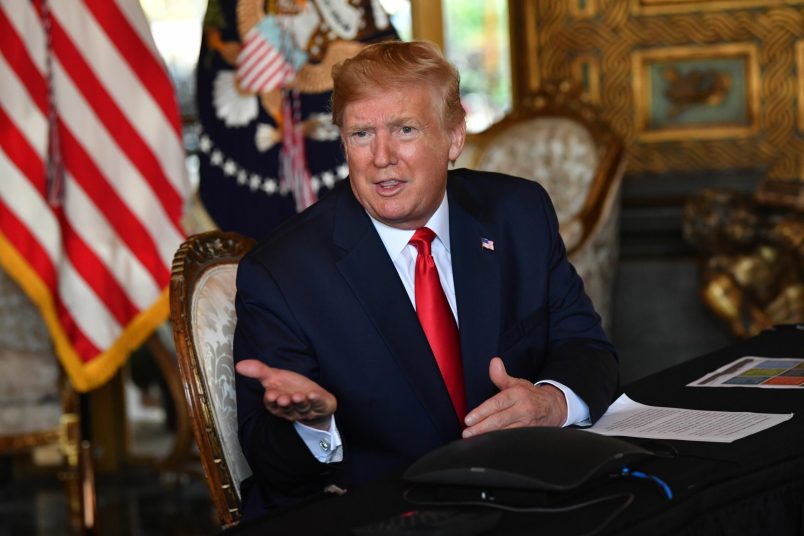For months, former President Trump and his allies have claimed that, at the end of his term in office, he issued a broad declassification order.
Some of these statements — from Trump acolytes such as the former Rep. Devin Nunes (R-CA) staffer Kash Patel — came even before the FBI executed search warrants at Mar-a-Lago last month.
Now, in a Monday court filing, Trump is repeating those claims, except for one key point: he won’t say in court that he actually declassified the records seized by the FBI.
Trump’s attorneys stopped short of that defense. Instead, they claimed that, hypothetically, Trump had the power to declassify the records in question, and that he very well may have done so. Besides, they argued, isn’t the burden on the government to prove that the records themselves were no longer classified?
“The Government contends that President Trump can have no such interest in the
purported ‘classified records,'” the filing reads. “But, again, the Government has not proven these records remain classified. That issue is to be determined later.”
Trump made the filing before U.S. District Judge Aileen Cannon for the Southern District of Florida. Judge Cannon earlier made the virtually unprecedented decision to intervene in the criminal investigation, granting Trump’s request for a special master to review the materials taken from Mar-a-Lago and imposing an injunction on federal prosecutors that stopped them from using them for their investigation.
The DOJ has said that it will appeal the order, which was met with a mixture of condemnation and bewilderment by legal experts.
In the meantime, prosecutors asked Cannon that she stay her order as it applied to the classified records.
Trump hit back against that on Monday, demanding that Cannon continue to stop the FBI from using the records for its investigation. He asked that Cannon keep the order in place, barring investigators from using the materials for the probe until after a special master goes through them.
The DOJ almost always guards the secrecy of its criminal investigations with intensity. That policy exists both to protect the integrity of the probe, but also to ensure that people who are investigated but end up uncharged do not suffer harm to their reputations absent a formal accusation of wrongdoing.
Trump argued that he should be able to dictate how federal prosecutors conduct the investigation.
“Given the significance of this investigation, the Court recognizes, as does President Trump, that it must be conducted in the public view,” he wrote in the filing.
He also called into question the legality of the underlying search warrant, writing that “whether it was lawful for the Government to seize those documents has yet to be determined by a court of competent jurisdiction.”
The DOJ said that if Cannon did not rule in its favor by Thursday, it would immediately file an appeal to the Eleventh Circuit.
Later on Monday, Trump made another request to Judge Cannon: could she make sure that both sides arguments’ about who should be appointed special master remain secret?
Having already argued that the entire investigation proceed in public, Trump asked that his reasons for wanting to disqualify the DOJ’s candidates remain confidential.
He suggested that it would be more “respectful” to the candidates to do so.







Sure, my client was found with the knife in his hand, splattered head to toe with the decedent’s blood, and the corpse lying at his feet. But the government hasn’t proved that she wasn’t already dead before he stabbed her 57 times.
Ignore this corrupt and/or stupid Judge and proceed defending our National Security.
The only thing Trump should be arguing about is whether he gets prison laundry duty or prison kitchen duty.
Buffoon, idiot, insurrectionist, fascist, autocrat wannabe, damned fool. Shall I go on?
So is this saying that Judge Cannon’s court is not the “court of competent jurisdiction”?
So is Trump and Co throwing K$sh under the bus because he saw classified documents that hadn’t been de-classified by Trump?